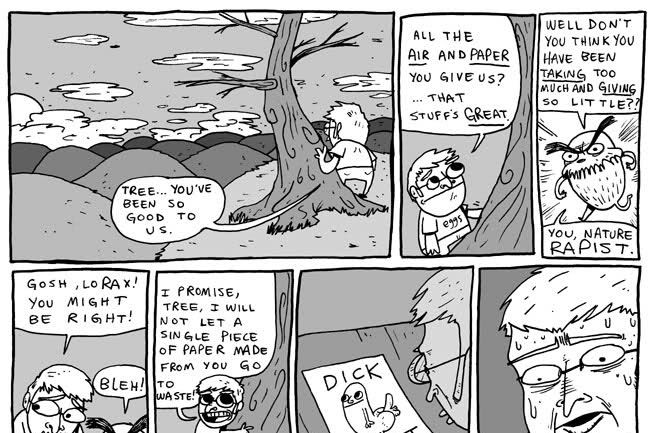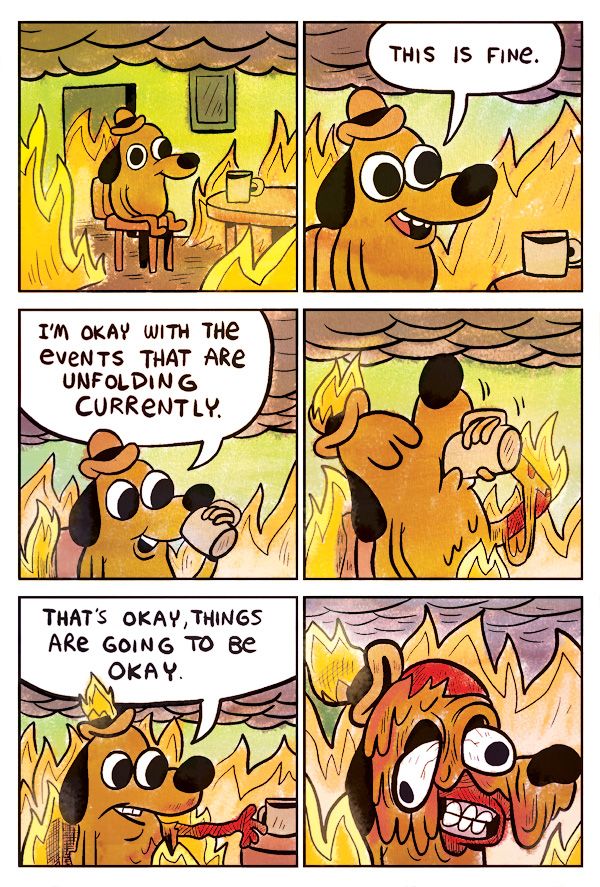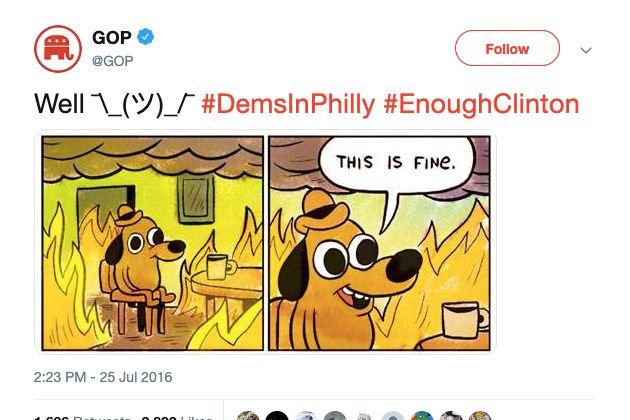
It’s taken for granted that a meme, once set free, will never return to the cage of copyright and creator control. You make something, it gets popular without credit, and you watch it slip through your grasp. Take, for example, Pepe the Frog. The character was first conceived by cartoonist Matt Furie for his ongoing comics series Boy’s Club, but its visage, for whatever reason, started being used by members of various online forums, then became popular on 4chan, then became a leading icon of the alt-right and an Anti-Defamation League–identified hate symbol. Furie has made noble efforts to stem the tide, from symbolically killing the character off to suing Alex Jones (they settled), but the damage is mostly done. Pepe is infamous, Furie is obscure, and the connection between the two has largely been severed.
And yet, there’s a counterexample that should inspire hope for anyone whose content has been ganked for the lulz. Another cartoonist, KC Green, similarly saw one of his characters meme-ified for political purposes. The figure was initially named Question Hound but has since been dubbed the This Is Fine Dog. Across social media, we see him sitting in a burning room with a dumb smile on his face, musing to himself, “This is fine.” It’s a simple, potent image that captures the tenor of our chaotic times and the reactions of those who refuse to accept awful reality, and it’s been used far and wide. What makes Green’s story different from those of folks like Furie is that he has, astoundingly enough, been able to harness the meme’s success for profit and greater recognition, and is surprisingly renowned as its creator. He says the trick is vigilance, luck, and not being afraid to steal from your thieves.
It also didn’t hurt that Green had already learned from past mistakes. In 2006, he published a comic for his series Horribleville in which a character draws an anthropomorphic phallus and names it “Dick Butt.” The image of Dick Butt went viral in certain circles and Green quickly lost control of it. “I didn’t even try and hold on to that copyright,” Green says. “To be honest, the type of people who like using that image are the people I don’t want to talk to. I’ve actually let go of the copyright on that, so idiots can use it as much as they want.” Nevertheless, even though he conceded defeat, he’d seen what the arena looked like.
The success of Dick Butt didn’t enrich Green, and he simply plugged away at his comics. A subsequent series, Gunshow, came into being in 2008, and the cartoonist proceeded to build it with a haphazard creative approach. Take, for instance, the origin of the 2013 comic that spawned the “This Is Fine” meme. “I used to write a lot by just opening an empty document and typing things that popped out of my head, things that were just stuck in my head and just whatever,” Green says. “It was just random writing. I believe that document was literally just I wrote down the actual lines of ‘This is fine. I’m completely okay with all of this.’ Then someone’s face slops off because they’re in a burning place, or whatever. That was all it took for me to write down an idea. Then, I was like, That’s good enough. Let’s use it.” Today, he looks back and suspects the origin of the comic had something to do with his then-recent adjustment to taking antidepressants: “It felt like things around me were … like I was ignoring the problem, basically,” he remembers. “A part of me wondered if the pill regimen would get rid of my emotions, or something like that.”
Whatever the subconscious underpinnings of that freewriting were, Green translated them into an efficient six-panel comic, entitled “On Fire,” which he published on January 9, 2013. He chose to have the strip star Question Hound, the series’s unofficial mascot since the very first strip of Gunshow, who was based on a cartoon dog that Green used to doodle as a kid. Green often used the hapless canine as a stand-in for himself, so it only made sense to have him feature in this tossed-off exploration of placidity in the face of disaster.
The first two panels of “On Fire” are the most famous: We see the dog among the flames, sitting silently, then we see him in close-up, saying his now-trademark line. After that, he continues: “I’m okay with the events that are unfolding currently.” He takes a sip from his mug and his arm catches on fire. “That’s okay, things are going to be okay,” he says as he looks at the limb. Finally, his face melts off. The end. Green says he doesn’t really check web analytics or social metrics, so he didn’t have any idea whether the comic was popular: “I was happy that it was there,” he says, “but it was also like, I’m on a schedule. That was Wednesday’s comic. Time to work on Friday’s.” He moved on.
According to the meme archaeologists at Know Your Meme, on April 26 of that same year, the famous first two panels appeared on 4chan’s sub-board for retro video games. They then spread to various Reddit boards, the social image site Imgur, and, as the months and years went on, they appeared with increasing frequency elsewhere on the web. Green didn’t much mind. It wasn’t a massive viral hit and wasn’t associated with anything particularly repugnant. He made a little money off an Adult Swim interstitial that animated the strip, and his internet-savvy fans seemed to be good at letting memers know who created the original. What was the harm?
But that all changed with the 2016 presidential campaign. During the run-up to that horrifying electoral contest, online punditry started making widespread use of Question Hound’s placid statement to describe any number of political disasters. Green continued to tolerate it, though the meme was going into uncertain waters. Then came July 25, 2016. On that day, the social-media team behind the official Republican Party Twitter account saw fit to appropriate those first two panels of “On Fire” for a tweet about the near-anarchic atmosphere during the first day of the Democratic National Convention in Philadelphia. The tweet simply copied and pasted those two panels and added the text, “Well ¯\_(ツ)_/¯ #DemsInPhilly #EnoughClinton” (the ¯\_(ツ)_/¯ is what the kids call a “shruggie,” an emoticon that is intended to represent a shrugging human).
Green’s feelings crystallized in that moment: “The RNC can use it as a joke on Twitter and I’m like, ‘Oh, man. Keep my name out of your mouth,’” he recalls. Less than an hour later, Green tweeted, “Everyone is in their right to use this is fine on social media posts, but man o man I personally would like @GOP to delete their stupid post,” and soon after that, comics site the Nib tweeted an image, drawn by Green in exchange for cash, of a GOP-style elephant burning alive while muttering, “This is fine.” Within a few days, the Nib posted a comics-format cri de coeur from Green entitled “This Is Not Fine,” in which Question Hound realizes that, in fact, his house is burning down; he puts the fire out while screaming and, ultimately, sits in horror in the ashen ruins. War had been declared.
Since then, Green has been his own best advocate in the fight for his dog’s future. For example, when The Daily Show posted an edited version of the meme with the show’s watermark on the image last year, he lashed out at them directly. “They paid me to use it in the end,” he says. “I was like, ‘That’s all I want. What I want is to be respected as a cartoonist here. This isn’t a random image you can put your logo on the side of like you’re ebaumsworld.com or something.’ I did talk to them and they’re like, ‘We really want to use it.’ I was like, ‘Well, I really want you to pay me.’ That’s all it was. They paid me.”
He also never lets up in his efforts to take down other people’s attempts to monetize his work and is in constant dialogue with his readers. “I definitely have really good fans looking out for me, to the point where I get emails maybe once a month about, ‘Hey, someone’s selling This Is Fine on Etsy’ and I’m like, Well, I guess I’ll also write that down.” He issues takedown requests at user-generated e-commerce sites like Etsy and Redbubble all the time. “I’ve done it enough that it’s like, ‘You guys should maybe know this by now. Do you guys not check that shit unless someone complains?’ The answer is probably, ‘Yes,’ which, I guess, I get it, because it’s a big store, but it’s still kind of lame that I have to keep doing this.” Nevertheless, he does do it and has been effective at keeping the bootlegging from getting out of control. He also harnessed his folk-hero status to launch a massively successful Kickstarter for a Question Hound plush toy — it aimed to raise $35,000 and ended up drawing $454,717. Not bad for a meme.
But most of all, Green has stolen from the people who stole from him. “I can write to Redbubble, or Etsy, or any other place, to ask them to take something down, but I think the best way to try and take it back yourself is to steal other people’s ideas,” he says with a laugh. “Like, Oh, they wanted a tote bag with this on it? Then I’ll make a tote bag with that on it. I’ll stop them. Like, they want a shirt print with just the two panels on it, so they go to Etsy to make a dumb version of the print. Then here” — that is, on his site and on his store at creator-friendly merch site TopatoCo — “we offer a print with just the two panels, or we offer a shirt with just the two panels, because that’s all people fucking want.” Turnabout’s fair play, after all.
When I ask Green what advice he’d offer to another cartoonist whose work has been stolen for viral fame, he pauses for a moment, then says, “Don’t let that one joke be the one thing that you really try to …” and trails off. He picks up again: “Make a stink and try not to let it keep you from continuing working, continuing to make something better than the thing people think is going to be your magnum opus. Don’t overwork yourself because of a meme joke, because people will take it and do whatever they want with it, with or without your permission, because that’s just kind of how it works online. It’s a tough balancing act. There’s no easy answer for that.”
The one thing that he does have an easy answer for is the question of whether creator rights should be respected in the age of the viral joke. “‘Information wants to be free. Jokes want to be free.’ Is that what people are trying to say? That’s so stupid,” he says. “That’s some horseshit thinking, to be honest. The fact that comics and humor like that permeate our culture does make a difference. Then, when people want to stop it or be like, ‘Actually, it’s just a joke, it’s not that big a deal,’ I go, ‘You made a big deal out of it first and now it’s not a big deal? You’re just gaslighting the person who was just trying to keep their IP, or whatever, trying to keep their work.’ It’s frustrating. It’s so goddamn frustrating.” He pauses for a second. “Humor is a big, important tool, that no one takes seriously,” he adds. “They always say, ‘It’s just a joke,’ but jokes got fucking Donald Trump in office. I don’t know what to fucking say to that, other than, ‘Shut up.’”
*A version of this article appears in the July 8, 2019, issue of New York Magazine. Subscribe Now!




